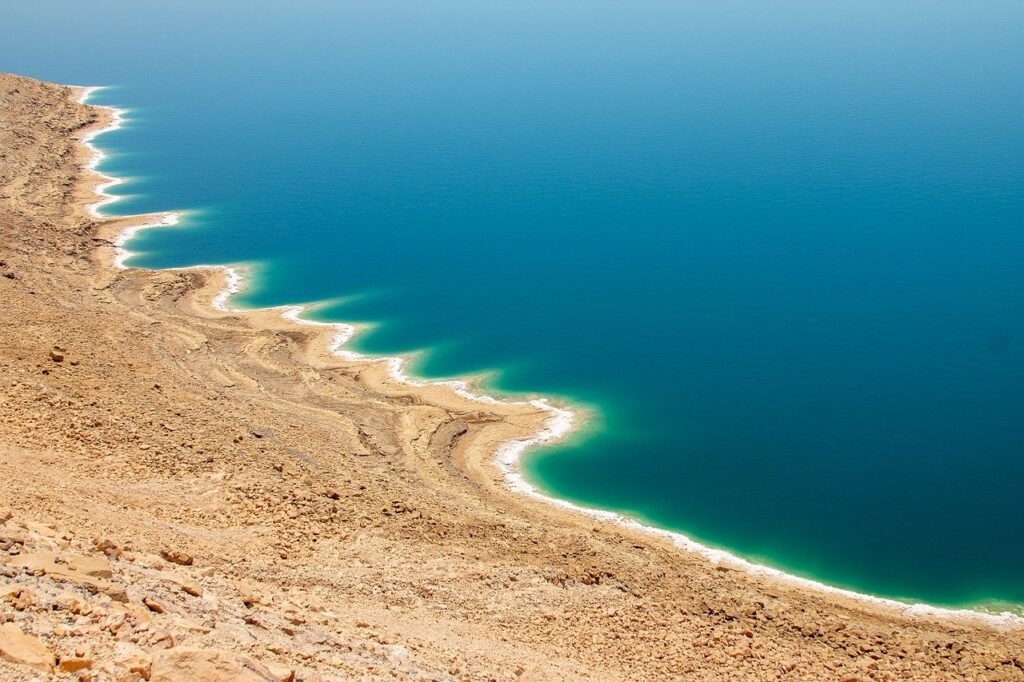I’ve always been fascinated by the allure of the Dead Sea, a natural wonder nestled between Jordan and Israel. Known for its mesmerizing landscapes and mineral-rich waters, it’s a destination that promises both adventure and relaxation. The idea of effortlessly floating on its surface, buoyed by the dense saltwater, is something that draws travelers from around the globe.
As we look ahead to 2025, exploring the Dead Sea is set to become even more exciting with new attractions and eco-friendly initiatives enhancing the experience. Whether you’re a seasoned traveler or planning your first visit, there’s something magical about immersing yourself in this unique environment. In this article, I’ll share tips and insights to help you make the most of your Dead Sea adventure, ensuring you leave with unforgettable memories and perhaps a little salt on your skin.
Discovering the Dead Sea: An Overview
My journey to the Dead Sea, nestled between Jordan and Israel, unveils a natural wonder like no other. Its surface, sitting over 1,400 feet below sea level, ranks as the Earth’s lowest terrestrial point, offering a unique landscape that’s both enchanting and surreal. The sea’s hyper-saline water holds 30% salinity, roughly ten times more than typical ocean water, making the famous floating experience an unforgettable reality.
The mineral-rich mud at the Dead Sea draws globetrotters eager for its claimed therapeutic benefits. Many visitors cover themselves head-to-toe in this dense, dark mud, which boasts an array of minerals like magnesium and calcium. Several resorts along its shores offer luxurious spa treatments harnessing these mineral-rich elements, adding to the rejuvenating allure.
In 2025, the Dead Sea region is set to become even more accessible and eco-conscious. Planned enhancements include improved transportation links, expanded beach areas, and an emphasis on sustainable tourism practices. Exciting new attractions promise to enrich the visitor experience while preserving this precious ecosystem for future generations.
Preparing for Your Trip
To make the most of your Dead Sea adventure in Jordan, consider some essential tips and insights. Planning ensures you have an unforgettable experience.
Best Time to Visit in 2025
In 2025, visit between March and May or September and October for pleasant weather. These months offer comfortable temperatures, avoiding the scorching summer heat. I always avoid visiting during holidays to escape crowds and enjoy a more serene atmosphere.
What to Pack for a Day at the Dead Sea
Pack light yet smart for a day by the water. Bring a swimsuit and a beach towel since you’ll be floating in the salty waters. Choose water shoes to protect your feet from rocky surfaces. I recommend high SPF sunscreen, a wide-brimmed hat, and sunglasses to protect against the intense sun. Carry a reusable water bottle to stay hydrated under the desert sun. Include a waterproof bag to keep electronics safe and mud-resistant lotions to care for your skin after your swim.
The Floating Experience
Floating in the Dead Sea is an unforgettable sensation. Its buoyancy stems from the sea’s high saline content, making it nearly impossible to sink.
Understanding the Unique Properties of the Dead Sea
The Dead Sea’s water contains over 30% salt, about eight times saltier than typical ocean water. This extreme salinity makes the water so dense that you naturally float. The salt also keeps the water free from most marine life, offering a serene floating experience in a pristine environment. Minerals like magnesium, calcium, and potassium add therapeutic benefits enhancing skin health.
Tips for Safe and Enjoyable Floating
First, avoid shaving or waxing 24 hours before visiting as the salty water can irritate sensitive skin. Enter the water slowly to prevent splashing, which might sting your eyes. Bring water shoes to walk on the rocky shoreline comfortably. Keep floating short, around 10-15 minutes, to avoid skin dehydration. Drinking plenty of water before and after helps counteract the effects of the saltwater. Lastly, rinse off under the freshwater showers available along the beach to remove excess salt.
Exploring Beyond Floating
Beyond the iconic floating experience, the area around the Dead Sea offers a wealth of attractions and experiences waiting to be explored. From historical sites to delectable meals, there’s something for everyone.
Must-Visit Attractions Around the Dead Sea
I recommend visiting the ancient site of Bethany Beyond the Jordan, where it’s believed John the Baptist baptized Jesus. This UNESCO World Heritage Site offers rich history and stunning views. Another spot, Mount Nebo, is pivotal in biblical history and presents breathtaking panoramas of the Jordan Valley and Dead Sea. For nature lovers, the Mujib Biosphere Reserve offers hiking trails through rugged landscapes, freshwater streams, and diverse wildlife. Adding to your itinerary, the Ma’in Hot Springs provide a relaxing escape with natural thermal waters cascading down rocky cliffs.
Local Cuisine and Culinary Delights
Jordanian cuisine around the Dead Sea is a must-try. You can savor Mansaf, the national dish of lamb cooked in fermented dried yogurt and served with rice. For a lighter option, I enjoy Falafel and Hummus, found at local eateries, offering a taste of traditional flavors with fresh ingredients. Don’t miss the chance to try Zarb, a Bedouin-style barbecue where meat and vegetables are cooked underground, providing a unique and aromatic experience. Finish your meal with Kunafa, a sweet pastry layered with cheese and soaked in syrup—perfect for satisfying a sweet tooth.
Explore these attractions and culinary experiences to make your Dead Sea adventure truly unforgettable.
Accommodation Options in 2025
Envisioning a 2025 stay by the Dead Sea involves a range of accommodations, catering to various preferences and budgets. From opulent resorts to budget-friendly lodgings, travelers can find an option that suits their needs.
Luxury Resorts and Spas
For those seeking opulence, the Dead Sea features numerous luxury resorts equipped with world-class amenities. I’m intrigued by places like the Kempinski Hotel Ishtar, offering panoramic beach views, spa treatments, and gourmet dining. The Movenpick Resort & Spa offers a blend of traditional and contemporary design, with private beach access and renowned wellness centers. The Hilton Dead Sea Resort & Spa provides plush accommodations, infinity pools, and personalized service for a truly lavish experience. These resorts often incorporate the therapeutic benefits of Dead Sea minerals into their spa offerings, making relaxation a key feature of any stay.
Budget-Friendly Stays
Travelers on a budget can find no shortage of affordable accommodation options. Hostels and guesthouses in nearby Madaba offer cozy settings and authentic Jordanian hospitality. The Dead Sea Spa Hotel provides mid-range comforts, allowing access to the rich landscapes without breaking the bank. Another economical option is Friends with a View, which offers comfortable lodgings and stunning panoramas of the Dead Sea. These options maintain an inviting atmosphere, making them ideal for those wanting to experience the Dead Sea’s unique appeal while watching their budget.
Sustainability and Responsible Tourism
Exploring the Dead Sea responsibly involves understanding sustainability efforts and how tourists can help preserve this natural wonder. Here, I’ll delve into current measures and ways we can all contribute.
Efforts to Preserve the Dead Sea
Authorities are committed to preserving the Dead Sea’s unique environment. Initiatives like the Red Sea-Dead Sea Water Conveyance Project aim to address water depletion by supplying the Dead Sea with water from the Red Sea. This project, expected to sustain the water levels, also plans to generate renewable energy in the process. Additionally, laws restricting unsustainable extraction of minerals protect its ecological balance. Hotels and resorts around the area are increasingly adopting eco-friendly practices, such as using solar power and reducing plastic waste, to support these preservation efforts.
How Tourists Can Contribute
Visitors play a pivotal role in maintaining the Dead Sea’s sustainability. Bringing reusable water bottles not only minimizes plastic waste but also encourages others to do the same. It’s crucial to stick to designated paths and avoid disturbing natural landscapes, ensuring minimal impact on the ecosystem. Participating in organized clean-up activities, which some resorts offer, can significantly aid these efforts. Emphasizing local products when shopping and dining supports community livelihoods and promotes a deeper connection with the region. By taking these actions, we can enjoy the Dead Sea while safeguarding its future.
Conclusion
Exploring the Dead Sea in 2025 promises to be an unforgettable adventure filled with unique experiences and breathtaking sights. With the upcoming improvements and a focus on sustainability, there’s never been a better time to plan a visit. Whether you’re floating effortlessly in the mineral-rich waters or exploring the nearby attractions, the Dead Sea offers something for everyone. Remember to pack wisely, savor the local cuisine, and embrace the region’s rich history and culture. By following the tips shared, you’ll be well-prepared to enjoy all that this incredible destination has to offer while playing a part in preserving its natural beauty for future generations. Happy travels!


